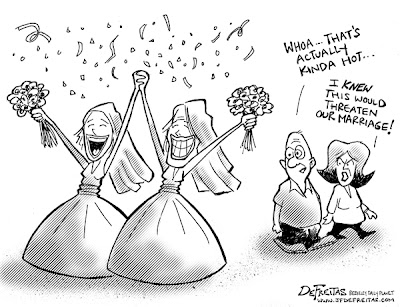After New York legalized gay marriage Southern Baptist Theological Seminary president Albert Mohler posted the following message to twitter (h/t Daylight Atheism):
Now, fully 1 in 9 Americans will live in a state with legalized same-sex marriage. Our mission field is getting more complicated.
Adam of Daylight Atheism offered his own gloss on this pronouncement, I’ve got a different hypothesis that requires some feedback by any opposed-to-gay marriage readers. First off, here’s what Adam wrote:
My wife and I discussed this, and I can only come up with one explanation that seems reasonable: Mohler is against same-sex marriage because he wants society to discriminate against non-Christians, thereby making conversion to Christianity a more attractive offer. If all people have equal rights, then Christianity will be forced to rely on its own persuasive power to make converts, rather than holding out unique privileges that are only available to Christians – and that’s a competition he fears!
And it’s not hard to see why. If proselytizers like Mohler seek to convince gay people that their sexual orientation is sinful, wrong and must be changed, they’ll have a much harder time making the case to people in a happy, stable, committed relationship with all the benefits offered by the state to opposite-sex couples. They’d prefer that GLBT people be a downtrodden and oppressed minority, punished and scorned by the state, unprotected against discrimination in jobs or housing, shut out from all the legal benefits society has to offer. They don’t want to compete on a level playing field, but one that’s tilted in their favor; they want people who won’t convert to suffer for their defiance.
I think there’s a simpler explanation. When gay marriage is legal, the Christian contention that it will destroy marriage, harm children, and generally blight human existence becomes testable. It’s easier to muster opposition against a hypothetical threat, and the more common gay marriage is, the easier it will be for individual Christians to draw their own conclusions. After all, that’s what happened when gay people came out of the closet.
Christians certainly don’t want any more David Frums (the conservative pundit who announced this week that after seeing gay marriage in practice, he had no data to support his previous opposition to gay marriage). This kind of reversal undermines Chesterton’s definition of the church as a “truth-telling thing” and could undermine confidence in other counter-cultural church teachings.
So I want to hear from all of you about what data you expect. Tell me how you’ll make your beliefs pay rent. One caveat: I don’t want citations for research that’s been conducted. That’s going to derail everyone into methodological nitpicking. I want open ended brainstorming, not problems with anchoring effects and privileging the hypothesis.
I’m also not going to be a methodology stickler right this second, so let’s not get bogged down in the problems of how we would run data collection or deal with confounding factors in this first pass. There’s time for that after we know what variables we’re interested in. If you want to start looking at possible research protocols, my hunch is that a difference-in-difference model. would be a good place to start.
And, last caveat: It’s fair for Christians to offer criteria that progressives don’t recognize as bad outcomes (later marriage age, more cohabitation, etc). We can spend time later arguing about their ramifications. For right now, I just want people to put their cards on the table about what they’re afraid of. It’s a given there will be a lot of disagreement about what an adverse outcome is, since Christians would probably put “leaving the church” on the list Atheists are also encouraged to comment about what they think would represent a poor prognosis for marriage.
I’ll start by throwing out two trends off the top of my head that I would find disturbing:
- An increase in the number of/percentage of marriages that produce children and end in divorce after <5 years
- A decrease in the amount of time people date before marriage
Now let’s hear what you’ve got. Comments are open for spitballing, and if anyone wants to offer a longer or more detailed proposal, talk to me about a guest post.


















